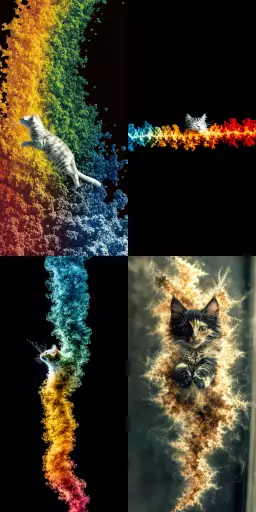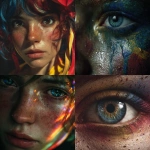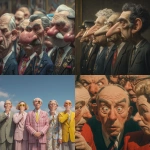Explore the Best AI Image Gallery

The Algorithmic Brush: AI Images in Marketing - A Revolution in Creative Expression
The world of marketing is undergoing a rapid transformation, fueled by the rise of artificial intelligence (AI). One of the most exciting developments in this realm is the emergence of AI-generated images, which are revolutionizing how brands communicate and connect with their audiences. From captivating social media content to personalized product visualizations, AI imagery offers a new creative frontier.
The Creative Canvas: Unleashing Artistic Potential
AI image generators leverage sophisticated algorithms trained on massive datasets of images and text. These algorithms can analyze patterns, understand concepts, and generate original visuals that are both aesthetically pleasing and conceptually relevant. This opens up a world of possibilities for marketers:
- Concept Visualization: Marketers can use AI to quickly visualize product ideas, campaign themes, or brand identities. Generating multiple variations allows for rapid iteration and exploration of creative directions.
- Personalized Content: AI can tailor images to specific customer demographics, interests, or even individual preferences, creating more engaging and relevant marketing experiences.
- Scalable Content Creation: Producing high-quality visuals can be time-consuming and expensive. AI image generation allows marketers to create vast libraries of content at scale, freeing up resources for other strategic initiatives.
Ethical Considerations: Navigating the Uncharted Territory
While the potential benefits of AI-generated images are undeniable, it is crucial to address the ethical considerations that accompany this technology:
- Copyright and Ownership: The question of who owns the copyright to AI-generated images is complex and still being debated. Establishing clear guidelines is essential to protect both creators and users of AI-powered tools.
- Bias and Representation: AI algorithms can inherit biases present in the training data, potentially leading to the creation of biased or stereotypical imagery. It is important to ensure that AI-generated content reflects diverse perspectives and avoids perpetuating harmful stereotypes.
- Transparency and Disclosure: Consumers have a right to know when they are interacting with AI-generated content. Transparent labeling and disclosure practices are crucial for building trust and maintaining ethical standards.
Future Trends: Shaping the Future of Creative Expression
The field of AI image generation is constantly evolving, with new advancements emerging at a rapid pace:
- Real-Time Image Generation: Imagine using AI to create dynamic visuals in real time, responding to user input or environmental changes. This could revolutionize interactive marketing experiences.
- Multimodal Content Creation: The future may hold AI systems that can generate not only images but also text, audio, and video, allowing for the creation of truly immersive and engaging content experiences.
- Personalized Brand Identities: AI could help brands develop unique visual identities tailored to their specific target audiences, creating a more personalized and impactful brand presence.
As AI image generation technology continues to advance, it is essential for marketers to embrace its potential while navigating the ethical complexities. By fostering responsible innovation and prioritizing transparency, we can harness the power of AI to create a future where creativity knows no bounds.





](https://images.ai-img.art/thumbnails/150/8561b450506900783584c556bf57ccab16188eb111ae0b9ec0cc34841b9a6825.webp)

](https://images.ai-img.art/thumbnails/150/e3a2739669e7e25395e2cc5578f479057e60973d76d85724a5758b6e1039ee3c.webp)






](https://images.ai-img.art/thumbnails/150/76d26b409b1a7acfd86a78c5d5047ff9bd7be9ecf55ce838cc2c854bf42c00be.webp)
](https://images.ai-img.art/thumbnails/150/546184a0cbf4b3d07f6ce10e72c0faf2a088fd4aac33c10422c11d76bf734be8.webp)

](https://images.ai-img.art/thumbnails/150/f401da92914cabe9929e88ee4a02fbe744702d0c12dcbbd71efa8cf4cf1a6fee.webp)











](https://images.ai-img.art/thumbnails/150/7c569b0eb6e7eddaf8d96b3e3532d8b0de6a7d79916c0ef333632070a3085997.webp)



](https://images.ai-img.art/thumbnails/150/912c326dfe63108e4ca5cdcf408c2247b3e7d4afacde8aac324b06a9a4a6913c.webp)


](https://images.ai-img.art/thumbnails/150/229d202f0ba192ad857509389a22aa5e3b948a813ee711996ae9d32631b486e0.webp)



](https://images.ai-img.art/thumbnails/150/fe2cfa6e64066976325cd677ef63e43820c1843dc81bcf90c0b68dc300689e03.webp)





](https://images.ai-img.art/thumbnails/150/c064d275c74e06a80b37064ffe83a30913361f0a4602f9a669e8ecbdb37ec6ad.webp)
](https://images.ai-img.art/thumbnails/150/5d3ed451a35bec12705494605ebbe909dc0f4319e9a6064ab824b39609ada54e.webp)
](https://images.ai-img.art/thumbnails/150/2055d76bd9940ffa62a06896525d0f07a5b57bbe3b766a043d977b1c678d69c1.webp)
